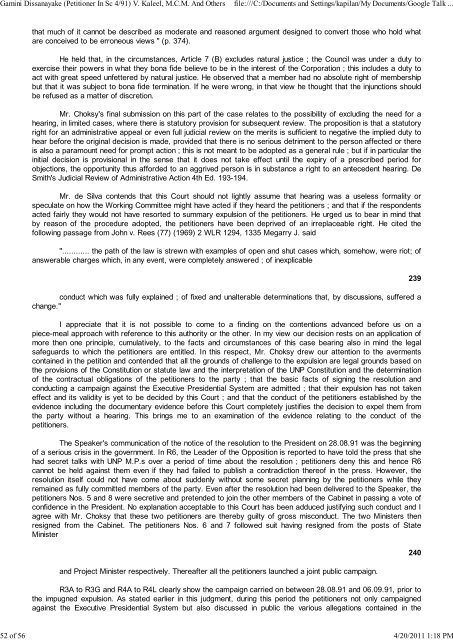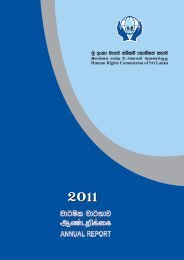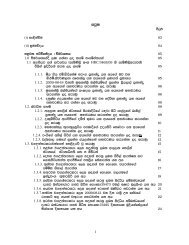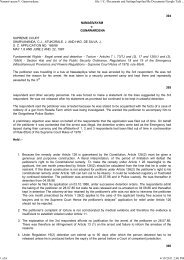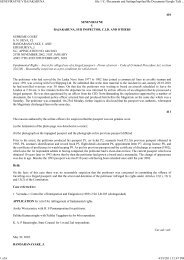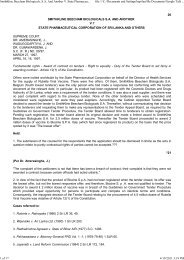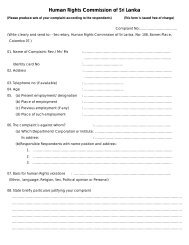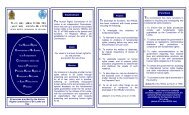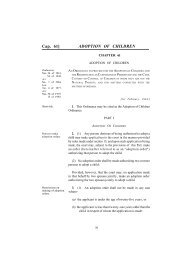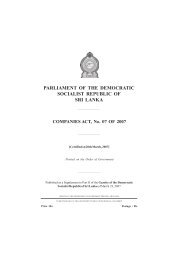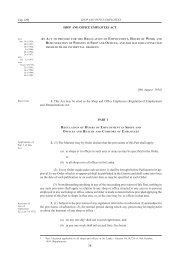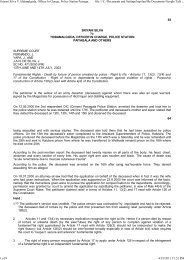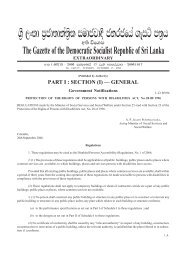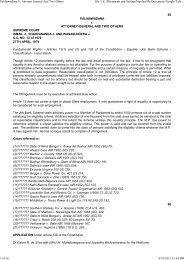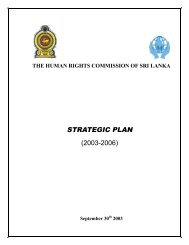Gamini Dissanayake (Petitio... - Human Rights Commission of Sri ...
Gamini Dissanayake (Petitio... - Human Rights Commission of Sri ...
Gamini Dissanayake (Petitio... - Human Rights Commission of Sri ...
You also want an ePaper? Increase the reach of your titles
YUMPU automatically turns print PDFs into web optimized ePapers that Google loves.
<strong>Gamini</strong> <strong>Dissanayake</strong> (<strong>Petitio</strong>ner In Sc 4/91) V. Kaleel, M.C.M. And Others file:///C:/Documents and Settings/kapilan/My Documents/Google Talk ...<br />
that much <strong>of</strong> it cannot be described as moderate and reasoned argument designed to convert those who hold what<br />
are conceived to be erroneous views " (p. 374).<br />
He held that, in the circumstances, Article 7 (B) excludes natural justice ; the Council was under a duty to<br />
exercise their powers in what they bona fide believe to be in the interest <strong>of</strong> the Corporation ; this includes a duty to<br />
act with great speed unfettered by natural justice. He observed that a member had no absolute right <strong>of</strong> membership<br />
but that it was subject to bona fide termination. If he were wrong, in that view he thought that the injunctions should<br />
be refused as a matter <strong>of</strong> discretion.<br />
Mr. Choksy's final submission on this part <strong>of</strong> the case relates to the possibility <strong>of</strong> excluding the need for a<br />
hearing, in limited cases, where there is statutory provision for subsequent review. The proposition is that a statutory<br />
right for an administrative appeal or even full judicial review on the merits is sufficient to negative the implied duty to<br />
hear before the original decision is made, provided that there is no serious detriment to the person affected or there<br />
is also a paramount need for prompt action ; this is not meant to be adopted as a general rule ; but if in particular the<br />
initial decision is provisional in the sense that it does not take effect until the expiry <strong>of</strong> a prescribed period for<br />
objections, the opportunity thus afforded to an aggrived person is in substance a right to an antecedent hearing. De<br />
Smith's Judicial Review <strong>of</strong> Administrative Action 4th Ed. 193-194.<br />
Mr. de Silva contends that this Court should not lightly assume that hearing was a useless formality or<br />
speculate on how the Working Committee might have acted if they heard the petitioners ; and that if the respondents<br />
acted fairly they would not have resorted to summary expulsion <strong>of</strong> the petitioners. He urged us to bear in mind that<br />
by reason <strong>of</strong> the procedure adopted, the petitioners have been deprived <strong>of</strong> an irreplaceable right. He cited the<br />
following passage from John v. Rees (77) (1969) 2 WLR 1294, 1335 Megarry J. said<br />
"............ the path <strong>of</strong> the law is strewn with examples <strong>of</strong> open and shut cases which, somehow, were riot; <strong>of</strong><br />
answerable charges which, in any event, were completely answered ; <strong>of</strong> inexplicable<br />
conduct which was fully explained ; <strong>of</strong> fixed and unalterable determinations that, by discussions, suffered a<br />
change."<br />
I appreciate that it is not possible to come to a finding on the contentions advanced before us on a<br />
piece-meal approach with reference to this authority or the other. In my view our decision rests on an application <strong>of</strong><br />
more then one principle, cumulatively, to the facts and circumstances <strong>of</strong> this case bearing also in mind the legal<br />
safeguards to which the petitioners are entitled. In this respect, Mr. Choksy drew our attention to the averments<br />
contained in the petition and contended that all the grounds <strong>of</strong> challenge to the expulsion are legal grounds based on<br />
the provisions <strong>of</strong> the Constitution or statute law and the interpretation <strong>of</strong> the UNP Constitution and the determination<br />
<strong>of</strong> the contractual obligations <strong>of</strong> the petitioners to the party ; that the basic facts <strong>of</strong> signing the resolution and<br />
conducting a campaign against the Executive Presidential System are admitted ; that their expulsion has not taken<br />
effect and its validity is yet to be decided by this Court ; and that the conduct <strong>of</strong> the petitioners established by the<br />
evidence including the documentary evidence before this Court completely justifies the decision to expel them from<br />
the party without a hearing. This brings me to an examination <strong>of</strong> the evidence relating to the conduct <strong>of</strong> the<br />
petitioners.<br />
The Speaker's communication <strong>of</strong> the notice <strong>of</strong> the resolution to the President on 28.08.91 was the beginning<br />
<strong>of</strong> a serious crisis in the government. In R6, the Leader <strong>of</strong> the Opposition is reported to have told the press that she<br />
had secret talks with UNP M.P.s over a period <strong>of</strong> time about the resolution ; petitioners deny this and hence R6<br />
cannot be held against them even if they had failed to publish a contradiction there<strong>of</strong> in the press. However, the<br />
resolution itself could not have come about suddenly without some secret planning by the petitioners while they<br />
remained as fully committed members <strong>of</strong> the party. Even after the resolution had been delivered to the Speaker, the<br />
petitioners Nos. 5 and 8 were secretive and pretended to join the other members <strong>of</strong> the Cabinet in passing a vote <strong>of</strong><br />
confidence in the President. No explanation acceptable to this Court has been adduced justifying such conduct and I<br />
agree with Mr. Choksy that these two petitioners are thereby guilty <strong>of</strong> gross misconduct. The two Ministers then<br />
resigned from the Cabinet. The petitioners Nos. 6 and 7 followed suit having resigned from the posts <strong>of</strong> State<br />
Minister<br />
and Project Minister respectively. Thereafter all the petitioners launched a joint public campaign.<br />
R3A to R3G and R4A to R4L clearly show the campaign carried on between 28.08.91 and 06.09.91, prior to<br />
the impugned expulsion. As stated earlier in this judgment, during this period the petitioners not only campaigned<br />
against the Executive Presidential System but also discussed in public the various allegations contained in the<br />
52 <strong>of</strong> 56 4/20/2011 1:18 PM<br />
239<br />
240


